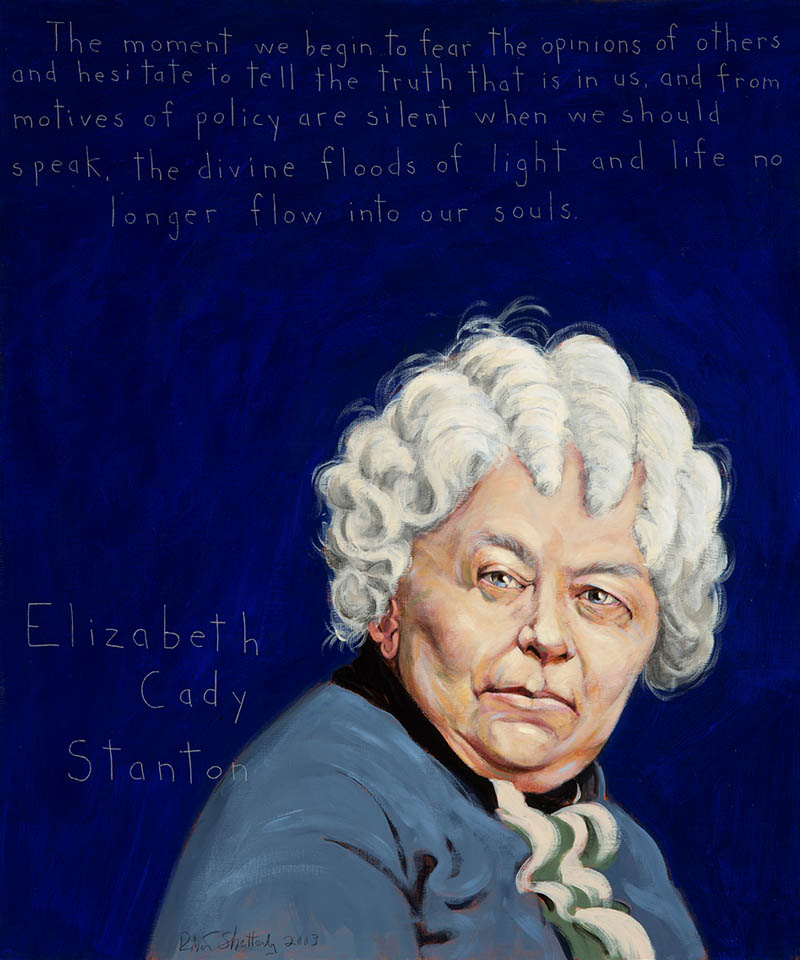
Elizabeth Cady Stanton
Reformer, Writer, Lecturer : 1815-1902
“The moment we begin to fear the opinions of others and hesitate to tell the truth that is in us, and from motives of policy are silent when we should speak, the divine floods of light and life no longer flow into our souls.”
Biography
Elizabeth Cady was born in Johnstown, New York, into the privileged life of a judge’s family. At eighteen she graduated from Troy Female Seminary and soon entered the world of social reform through her cousin, Gerrit Smith, who was helping fugitive slaves escape to Canada. At Smith´s home, she met the journalist and abolitionist Henry Brewster Stanton and married him in 1840.
When Elizabeth accompanied her husband to the World Anti-Slavery Convention in London, she encountered the women’s suffrage leader, Lucretia Mott, and shared her indignation at the convention’s refusal to seat women delegates. Extending the rights of women became the focus of Cady Stanton´s public life. An organizer of the first women’s rights convention in the United States at Seneca Falls, New York (1848), she drafted the women’s bill of rights, insisting on the right to vote.
Her long association with Susan B. Anthony began three years later and together the gifted writer and speaker (Stanton) and the dynamic organizer (Anthony) led the movement for equality. In addition to the campaign for suffrage, they championed reform of laws governing property, marriage and divorce, the extension of educational opportunities, reforms in dress and even in religion. “The Bible and the Church have been the greatest stumbling blocks in the way of women’s emancipation,” wrote Stanton, who, at the age of seventy, published the Woman’s Bible. Stanton and Anthony edited and published a militant feminist newspaper, The Revolutionary, and, with Matilda Joslyn Gage, compiled the first three volumes of the History of Woman Suffrage (1881-86). In 1898 she published her autobiography, Eighty Years and More. A list of her achievements includes the rearing of her seven children.
Elizabeth Cady Stanton met the mockery and criticism of her contemporaries with firmness and humor: “They tell us sometimes that if we had only kept quiet, all these desirable things would have come about of themselves. I am reminded of the Greek clown who, having seen an archer bring down a flying bird, remarked, sagely: ‘You might have saved your arrow, for the bird anyway would have been killed by the fall.’”
Programs
Americans Who Tell the Truth (AWTT) offers a variety of ways to engage with its portraits and portrait subjects. Host an exhibit, use our free lesson plans and educational programs, or engage with a member of the AWTT team or portrait subjects.

Education
AWTT has educational materials and lesson plans that ask students to grapple with truth, justice, and freedom.

Exhibits & Community Engagement
AWTT encourages community engagement programs and exhibits accompanied by public events that stimulate dialogue around citizenship, education, and activism.